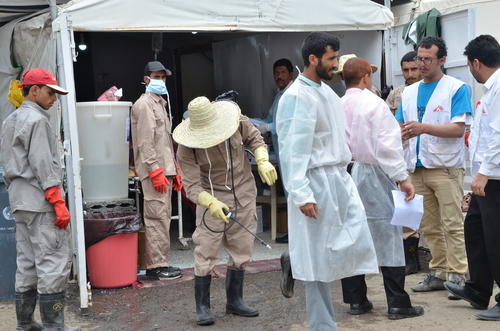The conflict in Yemen, which escalated in March 2015, has led to a full-blown humanitarian emergency.
According to UN data, more than 18 million people are in need of humanitarian aid, some three million are internally displaced, and tens of thousands of people have died or been injured. Food is scarce and prices have risen drastically.
Cholera outbreak
Against this backdrop, a cholera outbreak has been spreading since April 2017. Poor sanitation and the lack of safe drinking water due to the conflict make the population very vulnerable to the infection, particularly people suffering from chronic and acute malnutrition.
The number of suspected cholera cases reported by the World Health Organization (WHO) and national health authorities is much higher than during the first outbreak between October 2016 and March 2017, when 23,506 suspected cases were reported. The current outbreak also has a greater geographical spread, affecting 19 governorates out of 22 (compared to 15).
By mid-July, MSF had received 75,570 patients with cholera and acute watery diarrhoea at the 18 cholera treatment centres and units it has set up in nine governorates (Amran, Hajjah, Ad Dhale, Hodaidah, Ibb, Taiz, Sana’a, Aden and Abyan). In other locations, MSF is evaluating needs and providing support through donations.
Although the number of registered cases of cholera and acute watery diarrhoea fell in July for the first time since April, the outbreak has further weakened a health system seriously affected by the war and limited financial resources.
A smooth collaboration between UN agencies, NGOs and the health authorities will be vital in stopping the spread of the epidemic and preventing further outbreaks that the health system will be unable to respond to.
Outreach activities, including the chlorination of infected water sources and supporting local communities with the provision of hygiene kits, are key to limiting the spread of the disease. It is important for aid agencies to become involved in these activities, as well as in the management of treatment units. MSF is providing patients with hygiene kits and disinfection kits for themselves and neighbouring households.
NGOs (in addition to the Ministry of Health, WHO and donors) should ensure that there are no shortages of essential materials in the health facilities they are supporting. The importation of drugs must be facilitated and not limited to UN agencies, MSF and the ICRC.
In addition to treating patients, MSF teams are focusing on hygiene promotion in hard-to-reach areas, and are ready to support the chlorination of wells. Awareness-raising is being carried out via radio stations, community health workers and mosques.



